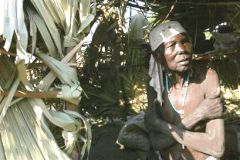Insecurity increases need for aid in northern Uganda, southern Sudan
KAMPALA, June 30 (AFP) — A marked decline in security in northern Uganda, rebel attacks in southern Sudan and food shortages in other areas have dramatically increased the need for humanitarian relief in those regions, aid workers said Thursday, appealing for a new infusion of donor cash.

|
|
An old woman seek refuge from the sun in her basic shelter, Thursday, Jan. 20, 2005 in a camp for returnee’s in Rumbek in southern Sudan. (AP). |
Recent developments, particularly stepped-up activity by the rebel Lord’s Resistance Army (LRA), have sent the bill for relief in 2005 from an initial estimate of 152 million to 188 million dollars (126 to 156 million euros), more than half of which has not yet been contributed, they said.
“If these gaps are not addressed, the humanitarian situation will worsen,” said Daouda Toure, the UN representative in Uganda. “The unmet requirements stand at 98,250,000 dollars.”
That figure includes the amount not contributed to the original 152-million-dollar appeal plus the additional needs brought about by the new unrest, he said.
The high level of insecurity is continuing to force thousands of people from their homes, leaving them almost entirely dependent on outside assistance, particularly food in increasingly remote locations, aid workers said.
In northern Uganda, where the LRA has stepped up attacks on civilians in recent months, as well as southern Sudan where the insurgents have bases, the situation is acute, they said.
“The persistent insecure environment, combined with the raising number of vulnerable refugees due to LRA activities … has resulted in an increase of the number of food beneficiaries,” Toure said.
Some 9,000 refugees from southern Sudan recently arrived in Uganda following attacks on villages and camps for the war-displaced there and many are still at UN reception centers with no adequate temporary shelter in the country’s northwest, he said.
Tens of thousands of people have been killed during the 19-year-old conflict while over 1.6 million have been driven from their homes and live in squalid conditions in camps dotting depending almost entirely on charity.
A drought in northeastern Uganda has also made people vulnerable, with some 574,000 dependent on World Food Programme assistance since February.
